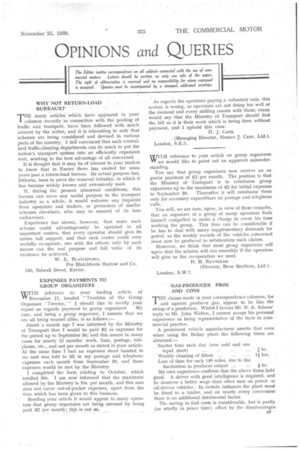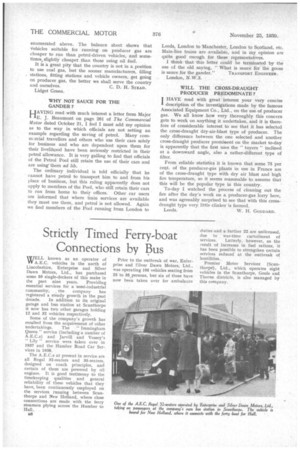OPINIONS and QUERIES
Page 33

Page 34

If you've noticed an error in this article please click here to report it so we can fix it.
WHY NOT RETURN-LOAD BUREAUX?.
THE many articles which have appeared in you columns recently in connection with the pooling of traffic and transport. have been followed with much interest by the writer, and it is interesting to note that schemes are being considered and devised in various parts of the country. I feel convinced that such centralized traffic-clearing departments can do much to put the nation's transport system into an efficiently organized unit, working to the best advantage of all concerned.
It is thought that it may be of interest to your readers to know that in Exeter there has existed for some years past a return-load bureau. Its actual purpose has, hitherto, been to serve the removal industry, in which if has become widely known and extensively used.
If, during the present abnormal conditions, this bureau can serve any useful purpose to the transport industry as a whole, it would welcome any inquiries from operators and traders, or promoters of similar schemes elsewhere, who may be assured of its best endeavours.
Experience has shown, however, that some such scheme could advantageously be operated in all important centres, that every operator should give its centre full support, and that each centre could very usefully co-operate, one with the others; only by such means can the real purpose and full value of its existence be achieved.
W. E, BLATCHFORD, For Blatchfords Burrow and Co. 140, Sidwell Street, Exeter.
EXPENSES PAYMENTS TO GROUP ORGANIZERS WITH reference to your leading article of " November 11, headed "Troubles of the Group Organizer 'Tweeny,'" I should like to rectify your report as regards payment to group organizers My case, and being a group organizer, I assume that we are all being treated alike, is as follows : About a month ago I was inforthed by the Ministry of Transport that I would be paid £2 as expenses for the period up to September 30,='and this means in many cases for nearly 12 months' work, time, postage, telephone, etc., and not per month as stated in your article. At the same time I had an expenses sheet handed, to me and was told to fill in my postage and telephone expenses each month from Septemlaer 30, and these expenses would be met by the Ministry.
I completed the form relating to October, which totalled 30s. I am now informed that the maximum allowed by the Ministry is 10s. per month, and this sum does not cover out-of-pocliet expenses, apart from the time which has been given to this business.
Reading your article it would appear to many operators that group organizers are being covered by being paid £2 per month; this is not so. • As regards the operators paying a voluntary sum, this system is wrong, as operators are not doing too well at the Moment and every shilling counts with them; many would say that the Ministry of Transport should foot the bill as it is their work which is being done without payment, and I uphold this view.
(Managing Director, Horace J. Cane, Ltd.). London, S.E.5.
wiTH reference to your article on group organizers IT we would like to point out an apparent misunderstanding.
You say that group organizers now receive an ex gratia payment of £2 per month. The position is that the Ministry of Transport is to reimburse group organizers up to the maximum of £2 for initial expenses to September 30. Thereafter it will reimburse them only for necessary expenditure on postage and telephone calls.
You will, we are sure, agree, in view of these remarks, that an organizer of a group of many operators finds himself compelled to make a charge to cover his time working the group. This time can be considerable if he has to deal with many supplementary demands for petrol, as the weekly records of the vehicles concerned must now be produced to substantiate such claims.
However, we think that most group organizers will agree that the scheme will run smoothly if the operators will give us the co-operation we need.
H. M. REYNOLDS (Director, Brew Brothers, Ltd.). London, S.W.7.
GAS-PRODUCER PROS AND CONS
THE claims made in your correspondence columns, for and against producer gas, appear to be like the swing of a pendulum. Whilst I favour Mr. N. A. Adams' reply to Mr. John Walton, I cannot accept his personal experience as being representative of the facts in commercial practice.
A prominent vehicle manufacturer asserts that even when using the Bellay plant the following times are obtained:— Starter time each day (one cold and one tepid Start) hr.
Weekly cleaning of filters ... hrs.
Loss of time for each 140 miles, due to the fluctuation in producer output ... hr.
My own experience confirms that the above times hold good. A driver with good intelligence is required, and he deserves a better wage than other men on petrolor oil-driven vehicles. In certain instances the plant must be fitted to a trailer, and on nearly every conversion: there is an additional detrimental factor.
The saving in fuel costs is considerable, but is partly (or wholly in peace time) offset by the disadvantages enumerated above. The balance sheet shows that Vehicles suitable for running on producer gas are cheaper to run than petrol-driven vehicles, and sometimes, slightly cheaper than those using oil fuel. It is a great pity that the country is not in a position to use coal gas, but the sooner manufacturers, filling , stations, fitting stations and vehicle owners, get going on producer gas, the better we shall serve the country and ourselves. C. D. H. STEAD. Lidget Green.
WHY NOT SAUCE FOR THE GANDER?
WAVING read with much interest a letter from Major I LE. j. Beaumont on page 261 of The Commercial Motor dated October 21, I feel I must add my opinion as to the way in which officials are not setting an example regarding the saving of petrol. Many cornm.2.rcial travellers and others who use their cars solely for business and who are dependent upon them for their livelihood have been seriously restricted in their petrol allowance. It is very galling to find that officials of the Petrol Pool still retain the use of their cars and are usingthem ad lib.
The ordinary individual is told officially that he cannot have petrol to transport him to and from his place of business, but this ruling apparently does not apply to members of the Pool, who still retain their cars to run from home to their offices. Other car users are informed that where train services are available they must use them, and petrol is not allowed. Again we find members of the Pool running from London to Leeds, London to Manchester, London to Scotland, etc. Main-line trains are available, and in my opinion are quite good enough for these representatives.
I think that this letter could be terminated by the use cf the old saying, "What is sauce for the goose is sauce for the gander." TRANSPORT ENGINEER. London, N.W.3.
WILL THE CROSS-DRAUGHT PRODUCER PREDOMINATE?
I HAVE read with great interest your very concise description of the investigations made by the famous Associated Equipment Co., Ltd.. on the use of producer gas. We all know how very thoroughly this concern gets to work on anything it undertakes, and it is therefore of considerable interest to see that it has selected the cross-draught dry-air-blast type of producer. The only difference between the one selected and another cross-draught producer prominent on the market to-day is apparently that the first uses the " tuyere " inclined at a downward angle, also a rather-different type of filter.
From reliable statistics it is known that some 75 per cent. of the producer-gas plants in use in France are of the cross-draught type with dry air blast and high fire temperature, so it seems reasonable to assume that this will be the popular type in this country.
To-day I watched the process of cleaning out the fire after the day's work on a producer-gas lorry here, and was agreeably surprised to see that with this crossdraught type very little clinker is formed.
Leeds. W. H. GODDARD.






























































